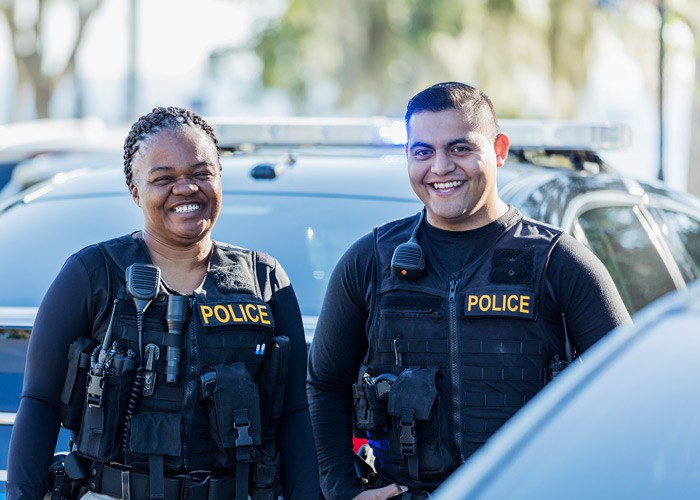Strengthening Community Bonds on a Budget: Low-Cost Trust Building for Police
Public trust stands as the bedrock of effective policing. Yet clashes around high-profile incidents have eroded citizen confidence in law enforcement. A 2021 Gallup poll found only 27% of Black Americans have “a great deal” or “quite a lot” of trust in their local police. Fortunately, rebuilding community relationships requires more perseverance than resources. Veteran police chief Frank Milstead notes, “It doesn’t cost anything to get out and meet people.”
Grassroots Gatherings
Informal community interactions based around everyday activities forge the deep roots of trust. The Coffee with a Cop initiative brings residents and police together over casual conversation instead of crime reports or traffic stops. Agency leaders cite events like block parties, school activities and neighborhood watches as pivotal for nurturing community allies.
Lt. Ryan Irving helped drive a 75% drop in violent crimes transforming Camden, New Jersey by “showing up to every event in the city where we can interact with residents.” Simply being approachable authorities familiar with daily life concerns makes tangible impact.
Director Bill Brooks notes, “It’s difficult to hate up close.” He stresses, “[If] all that the public knows of its police are negative media accounts, it’s little wonder that divide exists.” Neutral gatherings introducing citizens to officers as human beings behind badges close perception gaps.
Tailored Relationship Building
Trust manifests differently across communities. Latino citizens gravitate to soccer games with police while Black church leaders arrange cookouts. Youth form bonds easier through video games versus seniors at bingo halls. What works in one area falls flat elsewhere.
The key is assigning zone officers familiar with their constituents. Teams fluent in local languages, culture and spaces thoughtfully engage each population. It shows serving means more than reacting to calls.
Data analysis guides strategy by highlighting priority districts needing outreach. But only consistent presence chips away at skepticism built over generations not overnight.
Empowering Inside Access
Citizen police academies open the doors for residents to see policies enacted first-hand. Participants access training simulations, ask leaders questions, and ride along with patrols. Dispelling assumptions around force and protocol decisions builds factual understanding around realities officers face.
Graduates become partners correcting local misconceptions. Their insider experience lends authenticity explaining situations accurately to neighbors. Over 800 jurisdictions now host academies as their trust linchpin.
Gauge Interest Before Investing in Citizen Academies
Citizen police academies require considerable investments of department time, staffing and budget to administer effectively. Rather than assuming community enthusiasm and interest, savvy agencies first quantify actual demand through simple online surveys.
Leveraging tools like Officer Survey, police managers can quickly deploy brief polls asking residents about their familiarity with citizen academy programs. Additional questions gauge prospective willingness to participate across neighborhoods, demographics and more.
The automated surveys collect large sample sizes cost-effectively without phone banks or door knocking. The analysis shows objective community-wide interest levels before spending on program logistics and marketing. Quantified registration projections allow properly calibrating academy scope and sessions to neighborhood needs.
Just a week-long interest check prevents resources wasted on an undersubscribed or overwhelmed program. Post-academy surveys then confirm impact on perception, trust and satisfaction for continual improvement. Thoughtfully assessing community temperatures in advance leads to positive returns on citizen academy efforts.
The focus is on positioning a short community interest survey as a vital first step before undertaking full citizen academy development and promotion. This data-driven approach ensures efficient resource planning, aligned community expectations and greater downstream trust dividends.
Sustaining Progress
Without ongoing nurturing, community relations easily fray after high-profile incidents. Devoting resources solely when under fire breeds skepticism. Trust proves itself when times get tough so consistent foundation building matters most.
Agencies cite falling clearance rates, cooperation and overall safety when public confidence dips. So leaders prioritize engagement regardless of crises. Commissioner Michael Harrison made community collaboration one of Baltimore PD’s five key pillars reducing crime long-term.
Budget cuts may strain options but cannot be excuses. Surveys, data analysis and zone assignments cost little yet make big impact when applied methodically. With violent crimes increasing almost 30% nationally since 2020, agencies must double down on trust-building. Chief Cerelyn Davis noted it best asserting, “The health of a community depends heavily on the mutual trust between the police…and the citizens they serve.” That partnership remains the difference preventing neighborhoods from becoming statistics.
Community Surveys
Forward-thinking police departments across the country now leverage purpose-built tools like Officer Survey to capture detailed community sentiment through online surveys. The software platform streamlines creating customizable satisfaction polls for mass distribution across neighborhoods. Automated reporting summarizes responses on key perception metrics like safety, engagement effectiveness, accessibility and police professionalism.
Advanced filtering allows drilling into satisfaction levels across districts, demographics and other cuts. This precision targeting exposes improvement areas specific divisions. Powerful analytics quantify engagement gains by comparing metrics year-over-year. Data intelligence further helps leaders accurately measure community relationship programs and guide informed resource allocations. Over a dozen innovative agencies currently employ Officer Survey delivering technology-driven, real-time insights toward responsive, hyperlocal community policing.
The focus is on highlighting Officer Survey’s benefit in enabling police departments to efficiently conduct recurring community surveys. Key messaging calls out advanced analysis functionality allowing granular insights plus tracking satisfaction over time. This positions Officer Survey as purpose-built to empower data-driven engagement strategies for modern policing. To learn more, please schedule your free demo today!






